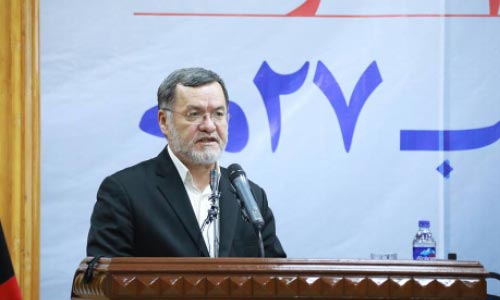Danish says Afghans are supporting peace in order to preserve the achievements of the past 18 years.
KABUL - Senior officials from President Ghani’s administration, including Second Vice President Mohammad Sarwar Danish, marked the Journalists National Day at a ceremony in Kabul on Monday.
Addressing the event, Danish said freedom of the press, which is one of the biggest achievements of Afghanistan in the past 18 years, should be preserved in the peace talks with the Taliban – who were once against freedom of the press during their rule in Kabul between 1996 to 2001.
He said the Afghan people and government are supporting peace in order to preserve the past 18 years’ achievement, especially the freedom of the press.
“All stakeholders in Afghan peace talks should assure the people that freedom of the press will be maintained,” Danish said.
He said holding transparent elections will not be possible in absence of freedom of speech, adding that a society without freedom of the press will be exposed to war and violence.
Danish said journalists should act impartially while reporting.
“A journalist should reflect the facts impartially,” Danish said. “Under current circumstances of Afghanistan are responsible to consider national interests (in their reports),” Danish added.
Government named 27th of Hoot, March 18, as Journalists Notational Day.
This comes as a group of Afghan journalists at a gathering in eastern Nangarhar province on Saturday, March 18, expressed their concerns over their safety and said threats against media workers have increased recently.
In a recent incident, an employee of a local TV network in Khost province – Zhman – was killed in an attack by armed men in Khost city on Friday. He was the fourth journalist who lost their lives in armed attacks so far this year.
The journalists said that besides threats by armed men, they are faced with threats by individuals within government.
The Khost journalist, Sultan Mahmoud Khairkhwah, 60, was the fourth journalist killed in Afghanistan so far this year.
Last week, Nisar Ahmadi, a local TV journalist in Helmand, was wounded in an IED blast in Lashkargah city.
‘Worst Country For Journalists In 2018’
A report by the Kabul-based Journalists Safety Committee released in January shows that Afghanistan, with 120 cases of violence against journalists, has been ranked for the second time as the most dangerous country for journalists in 2018.
Security threats and lack of access to information continue to impede activities for reporting, the report says.
According to the report, Cases of violence against Afghan journalists in 2018 include 17 cases of murder and others mainly of beatings, intimidation and kidnapping.
The report says that 11 cases of violence were recorded against female journalists.
Kabul was the most dangerous place for journalists with 42 cases of violence, according to the report. Despite challenges for the media in Afghanistan, 57 new media outlets began activities in the country during 2018, the report added.
Figures by Afghan government show that there are 96 TV channels, 65 radio stations and 911 print media in Kabul, as well as 107 TV channels, 284 radio stations and 416 print media in other provinces.
The First Vice President Mohammad Sarwar Danish said last month that there are 1,879 active media outlets in Afghanistan. He said the freedom the press and the media are the main achievements of Afghanistan in the past 18 years and that they will not be ignored in the peace process. (Tolo news)
Home » Afghanistan » Danesh Stresses on Preserving Freedom of Press in Peace Talks
Danesh Stresses on Preserving Freedom of Press in Peace Talks

